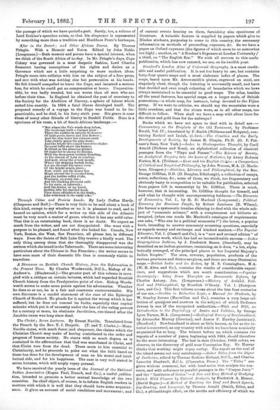Afar in the Desert and Other African Poems. By Thomas
Pringle. With a Memoir and Notes. Edited by John Noble. (Longmans.)—Both memoir and poems have a special interest, when we think of the South Africa of to-day. In Mr. Pringle's days, Cape Colony was governed in a most despotic fashion, Lord Charles Somerset having conceptions of his rights and duties as a Governor which are a little surprising to more modern ideas. Pringle came into collision with him on the subject of a free press, and met with what was nothing else but persecution at his hands. He felt himself compelled to leave the Cape, and incurred a serious loss, for which he could get no compensation at home. Unquestion- ably, he was badly treated, but not worse than all men who are before their time. In England he obtained the post of secretary to the Society for the Abolition of Slavery, a sphere of labour which suited him exactly. In 1834 a fatal illness developed itself. The proposed remedy of a voyage to the Cape was found to be im- practicable, and he died, in his forty-sixth year. His grave is near those of many other friends of liberty in Bunhill Fields. Hero is a specimen of his verse, a bit of South-African landscape :-
" But where the Va'e winds deep below,
The landscape bath a warmer glow There the spekboom spreads its bowers Of light-green leaves and lilac flowers ; And the aloe bears her crimson crest Like stately queen for gale, drest ; And the bnght-blossomed bean-tree shakes Its coral tufts above the brakes, Brilliant as the glancing plumes Of sugar-hints among its blooms, With the deep-green verdure blending, In the stream of light dweending.
And now, along the grassy meads,
Where the skipping reebok feeds, Let me through the mazes rove Of the bright acacia grove ; Now, while yet the honey-bee Hums around the b'ossomed tree, And the turtles softly aide, Wooingly, on every side; And the clucking pheasant calls To his mate, at intervals ; And the dinker, at my tread, Sudden lifts his startled head, Then dives affrighted in the brake, Like wild-duck in the reedy lake."














































 Previous page
Previous page